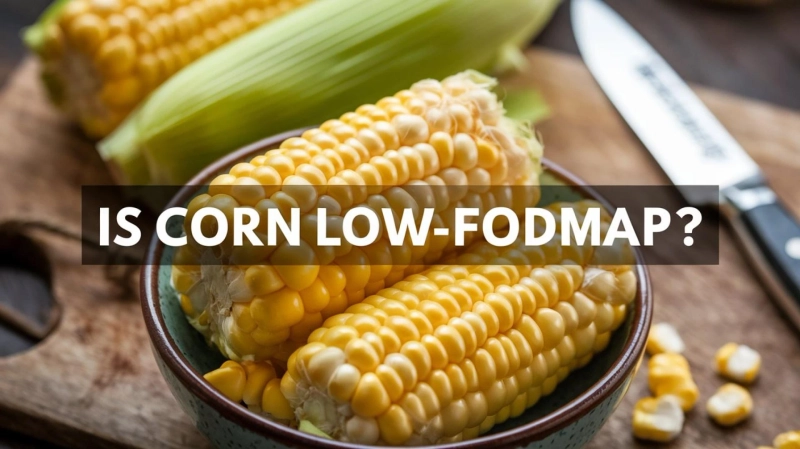If you're following a low-FODMAP diet for Irritable Bowel Syndrome (IBS), you're probably used to scrutinizing every ingredient on your plate. One food that often raises questions is corn. So, is corn low-FODMAP, and more importantly, is corn OK for IBS? Let’s break it down.
Understanding Corn and FODMAPs
Corn is a staple in many diets — whether as corn on the cob, popcorn, cornmeal, or canned corn. But not all corn is created equal when it comes to FODMAP content.
FODMAPs (Fermentable Oligosaccharides, Disaccharides, Monosaccharides, and Polyols) are types of carbohydrates that can trigger digestive symptoms like gas, bloating, diarrhea, or constipation in people with IBS. Some corn products are perfectly safe, while others are high in FODMAPs and can aggravate your symptoms.
When Is Corn Low-FODMAP?
The answer to "is corn low-FODMAP" really depends on the form and portion size. Here’s a breakdown:
- Corn kernels (fresh or canned):
- Canned sweet corn is high in FODMAPs in larger amounts. However, a small portion — typically around 1/4 cup (drained and rinsed) — can be tolerated by many people with IBS. Always start small and observe how your body reacts.
- Popcorn:
- Plain, air-popped popcorn is low-FODMAP and generally safe for people with IBS in moderate amounts (around 7-8 cups popped). Just avoid butter, artificial flavors, and large portions.
- Cornmeal and Polenta:
- These are low-FODMAP in serving sizes around 1/2 cup cooked. They're a great gluten-free grain option for IBS-friendly recipes.
- Corn tortillas:
- Check labels, but traditional corn tortillas (made with masa harina) are usually low-FODMAP, provided the serving size is about 2 tortillas (approximately 50 grams).
- Corn on the cob:
- Fresh corn can be a gray area. When eaten straight off the cob, a small portion (half an ear) is considered low-FODMAP, but larger amounts may trigger symptoms.
Is Corn OK for IBS?
So, is corn OK for IBS? The answer is: yes, in moderation and when chosen in the right form. Everyone’s tolerance is different, so the key is portion control and paying attention to your body's signals.
Many people with IBS find that lower-FODMAP forms of corn like popcorn or masa-based products are easier on the gut, while sweet corn or canned corn can cause issues if eaten in excess. Introducing corn slowly into your diet during the reintroduction phase of a low-FODMAP plan is the safest approach.
IBS and Corn: Practical Tips
When it comes to IBS corn questions, here are some practical tips:
- Start Small: Test small portions of corn-based foods and increase gradually based on tolerance.
- Watch for Added Ingredients: Many packaged corn products contain high-FODMAP additives like high-fructose corn syrup, onion, or garlic.
- Rinse Canned Corn: Rinsing can help reduce FODMAP content.
- Monitor Your Symptoms: Keep a food diary to track how your body responds to different types of corn.
Conclusion
So, is corn low-FODMAP? The short answer is: it can be, but it depends on the form and portion size. Whether you're enjoying air-popped popcorn during movie night or using cornmeal in a recipe, corn can fit into a balanced low-FODMAP diet when eaten mindfully.
And to answer the other common question — is corn OK for IBS — yes, for most people, in the right quantity and preparation. Managing IBS corn intake is all about portion control and knowing which varieties work best for your digestive system.
Always consult with a dietitian for personalized guidance, especially when managing IBS with a low-FODMAP plan.


